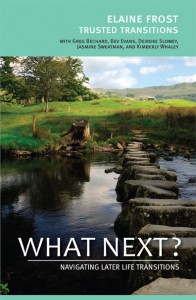“What you are is where you were when.” Morris Massey
I first heard this phrase during management development training at IBM. Morris Massey coined the phrase in the 1970’s and it has resonated with me ever since. His premise is that the values of our past directly drive how we behave. If we took the time to understand the drivers of people’s behavior, we would be better equipped to work with them.
What triggered this memory today? I had a conversation with a cousin over lunch and we were lamenting that an 80 something aunt is still living with a niece in the home she grew up in. Living in a large Victorian home in downtown Toronto, she climbs 20 uncarpeted steps to her bedroom and bathroom with her cane in hand. She spends most of her time sitting in the kitchen.
Being a chatterbox of sorts, we really think she would be much happier living in a retirement residence where there are activities, folks about, Bingo, the hair salon, companionship and men to flirt with.
But, no. Not for her. She is going to stay in her home. She says, “Nothing can compare to being in your own home. There is only one way I will leave.” Is she happy? We don’t believe so.
We need to understand that she is part of the generation of savers not spenders. Looking through their eyes, today’s rent for retirement residences is huge. They lived simply, and believe that they can continue to live simply.
I wish they could see and accept:
- That the home they worked so hard for can now work for them because the asset value in their house will allow them to live well now rather than focussing on what it will cost them to live.
- That it is OK to spend the money on themselves and that it is not necessary to leave it to their children. Their children would like them to be happy, healthy and living well.
As my cousin said, “Today we can say we would rather be happy and therefore make the decision to move. But will we think like that at 80?”
I would like to think we will.


January 2nd, 2017 at 2:18 am
This post is old and I don’t know how your aunt is doing or where she’s living today. But you might want to read Being Mortal by Atul Gawande. He’s a doctor who argues persuasively that living well in one’s own home, even for a shorter time, is usually better than living poorly in senior living. The move and change is a real problem for most people.
http://atulgawande.com/book/being-mortal/
January 18th, 2017 at 3:58 pm
Thank you for your comment and the book recommendation. I love to read and always appreciate and learn from others perspectives.